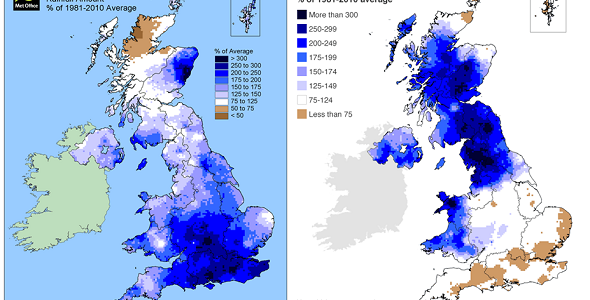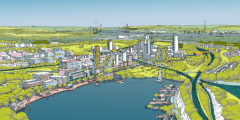Blue-Green team
View this author's profilePosts by Blue-Green team
Surface water flood risk and resilience
October 18, 2018
In this blog Emily O’Donnell reports on the key messages from the CIWEM (Chartered Institution of Water and Environmental Management) Surface Water Management 2018 conference (17th October). The aim of the conference was to provide a review of the progress of flood risk management, resilience and response in the UK since the publication of the …
Using System Dynamics for Sustainable Water Management in Ebbsfleet: Part 3
October 2, 2018
This blog continues from Part 2 and presents a preliminary causal loop diagram created by the research team using the metrics and variables identified by the stakeholders in the last three workshops. It should be stressed that this is an iterative process. This will be presented to the stakeholders, whom will reiterate it over the next …
SUDSnet International conference and network
September 18, 2018
In this blog Vladimir Krivtsov shares his very positive impressions of the recent SUDSnet conference, which he had the pleasure to attend at the end of August 2018. It took place at Coventry University, and was dedicated to the celebration of 15 years of SUDSnet’s existence. SUDSnet is a UK-wide network for researchers, practitioners, agencies, developers …
Human-Environment Interactions and the El Niño Costero floods in Piura, Northern Peru
September 14, 2018
In this blog, Leon Kapetas discusses flooding, vulnerability and risk management in Piura, Peru. When Piura’s civil protection team asked residents to evacuate their villages in Piura’s river floodplain, they hesitated to leave. They knew that a flood was going to arrive soon and put themselves and their properties at risk, but they also knew …
Using System Dynamics for Sustainable Water Management in Ebbsfleet: Part 2
September 12, 2018
In a previous blog (System Dynamics Part 1), we gave a presentation of the Ebbsfleet case study, summarised what delivering a System Dynamics model could entail and began the process of developing the model by defining the problem. In this blog post, we will go over the next step, the definition of metrics and variables, while …
Aligning ancient and modern approaches to sustainable urban water management in China
July 13, 2018
Flood prevention and risk management is high on the state agenda in China, owing in part to disastrous large-scale flooding in Beijing in 2012. Rather than solely relying on increasingly larger piped (grey) infrastructure, there has been investment in more natural approaches to manage stormwater, utilising blue and green infrastructure and sustainable drainage systems (SuDS). …
Learning and Action Alliances (LAA) as solutions to wicked, complex problems
June 26, 2017
In one of the previous blog posts, Emily Lawson introduced the concept of Learning and Action Alliances (LAA’s) as a solution to the ‘wicked’ problem of urban water management. The premise here is that a ‘wicked’ problem cannot be tackled from within the confines of science alone or through the mechanisms of top-down governance. This …
Low-cost small-scale blue-green interventions: community led projects enhancing urban flood resilience
May 2, 2017
You need just 5 water butts to capture an hour of heavy rainfall from a 200 m2 roof (assuming the water butt holds 200 L and rainfall intensity is 4-8 mm/hr). Imagine if that happened across every roof in the city and imagine the resources that could be provided and the costs you’d avoid – …
Twenty65 Annual Conference 2017
April 6, 2017
This week I attended the Twenty65 Annual Conference 2017 – Bringing the Water Sector Together (April 4-5th, Manchester). TWENTY65, an EPSRC research project, are working in partnership across the water sector to tailor water systems so that they deliver positive impact on health, the environment, the economy and society. The conference provided an opportunity for academics, practitioners, policy makers …
SCOT Flood Forum – 23rd February 2017
March 1, 2017
The Urban Flood Resilience team were invited to showcase their project aims, objectives and case studies at the February meeting of the SCOT Flood Forum. This was a great opportunity for the ‘Achieving Urban Flood Resilience in an Uncertain Future’ (UFRM) research project to introduce its wide reaching research team (including social scientists from the Open …


